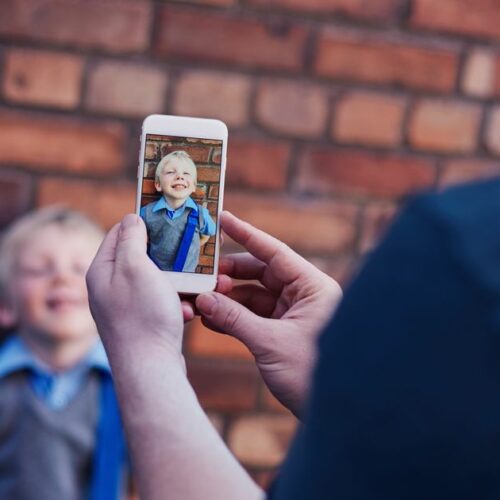St. Louis mom Deidre Belton, like parents everywhere, knows that her child is absolutely adorable.
When Alexander was small, he became accustomed to Belton and other doting relatives telling him, “You’re such a handsome little boy.”
His usual response? “Yes, I am.”
Belton has noticed, however, that as he approaches puberty, her now-fifth grader is showing signs of taking a more critical eye to images of himself — examining them with the gaze of his peers instead of that of his adoring family.
For a school project, he was tasked with bringing in a baby photo. But when Belton provided him with one, he refused to take it in, saying, “I’m just worried somebody will say I look like an alien.”
Belton remembers thinking, “What is going on?”
Realizing that her own body-consciousness was impacting her child, Belton has begun to check the comments she makes about her own appearance. This strategy, coupled with keeping Alexander off of social media, has been effective — for now.
But Belton is bracing for the turmoil around self-image that adolescence will bring, particularly in a day and age when everyone’s bodies are so thoroughly documented.
“All they see is images,” Belton observed, describing her son’s generation. “All day they’re on the computer, they’re on a tablet … and then they’re very critical of themselves and other kids. It’s like the older that they get, the more conscious that they become about their self-image and how they look.”
HuffPost asked several experts how parents can support their children through this phase of looking at themselves critically and help them maintain a positive relationship with their bodies.
Expect self-criticism, but don’t condone it.
There isn’t one age at which kids begin to criticize pictures of themselves, but “becoming critical is not uncommon when one is at an awkward time in growth and development,” psychologist Crystal Williams, Ph.D., told HuffPost.
The route that their body takes into adulthood can be a source of struggle for adolescents.
“Girls usually mature before boys and many put on weight before they grow taller, which feels shameful in our ‘never too thin or too rich’ society. Boys, who on average will end up taller than girls, can be shorter than girls in middle and early high school, which can be embarrassing,” said Dr. Michael Rich, director of the Digital Wellness Lab at Boston Children’s Hospital.
“Whatever their bodies do, they feel that everyone is looking at them and judging their appearance unfavorably,” Rich continued.
Dietician and intuitive eating coach Alissa Rumsey, author of the book “Unapologetic Eating,” said, “I have worked with a lot of clients who share with me that they first became aware of the idea that their body was ‘wrong’ around the time of puberty, due to comments from peers, family members, doctors or other adult role models.”
Such physical changes often bring about a fixation on appearance. But that doesn’t mean that parents should simply accept their child’s negative talk.
“If the self-criticism becomes debilitating, destructive or pathological,” Williams said, then parents should seek professional help.
Just because the situation isn’t grave doesn’t mean you should meet your child’s self-criticism with silence, however. Talking with them can help you assess what’s going on and show them that they have your support.
Resist the urge to jump in and contradict their criticism.
You may be dying to say, “But you look amazing!” Try to fight this urge and hold your tongue.
“As a parent, it is only natural for you to want to ‘fix’ everything for your child and to take these painful feelings away — but it’s not that simple. Know that your child feeling this way is not your fault, and you can sit with them in these feelings,” said Rumsey.
Ask open-ended questions.
When your child says something critical about the way they look in a photo, “be curious,” Williams advised.
She suggests asking questions such as, “What makes you say that about yourself?” or “What would you change about yourself if you could? And why?”
Criticism “could really be masking gender confusion, early development stress — being the tallest, developing larger breasts, being in a bigger body — physical malady/disability, or even an eating disorder,” Williams continued.
In order to help, you’ll have to first figure out the nature of the issue.
“Talk with them about the story they are telling themselves about their body, and where these beliefs came from,” advised Rumsey.
She adds that you can help them reframe an image by asking them questions about what was going on or how they felt when the photo was taken.
You can also help them to identify this voice of their inner critic and strategize about ways to respond the next time they “hear” it.
“Ask your child what they might say to a friend” voicing similar concerns, Rumsey suggested.
Strategically share your own experience.
If your child says something negative about the way they look in a photo, “the best response is not to reassure the child — they won’t believe you anyway,” said Rich, but to talk about a similar reaction you had when you were their age.
“This takes the focus off the child and the image of concern, acknowledges with warmth and humor that the parent struggled with similar feelings, and shows the child that they are OK with it now,” Rich continued.
Sally Anscombe via Getty Images
Be aware of the ways social media can amplify kids’ feelings about their appearance.
The emotional arc of adolescence hasn’t changed, but technology has shifted their experience and “amplified their developmentally normative, if uncomfortable, self-consciousness,” said Rich.
Kids are constantly taking selfies and livestreaming, documenting their every move — “as if, undocumented, it didn’t happen,” Rich noted.
The barrage of images, many warped by filters, means that today’s kids “are susceptible to constant comparison and chasing after an impossible standard,” said Rumsey.
“The underlying messages tied up in these images, such as appearance being directly tied to a person’s morality and worth and that our bodies need changing to be accepted, respected, and loved in this society,” can cause harm, she said, even when the individual images themselves are innocuous.
If you notice your kids using filters on their own pictures, ask them why.
“Filters are most frequently used for fun, but can be used to redirect attention away from a perceived flaw,” Rich said.
If your child is upset about a photo someone else posted of them, it may be worth learning more about the situation.
You should also be aware that “unflattering photos of others can be posted, with or without filters that exaggerate ‘flaws,’ as a form of cyberbullying,” he said.
If your child is posting photos of others, ask them how they’ve selected the images, and how they think the people in them might feel about seeing them shared.
You should also talk to your child about who they’re following on social media, and how looking at posts makes them feel.
Encourage them “to follow individuals and role models with diverse body types and unfiltered photos and unfollow those that promote unrealistic standards,” said Rumsey.
Emphasize all the other things you love about your child.
When you’re looking at pictures together, you might comment on physical traits you love about your child that are unique to them: a dimple, their smile, the way they resemble a family member.
In our appearance-obsessed culture, it’s also important to recognize the things you love about your child that have nothing to do with the way they look.
“Reinforce the attributes that have nothing to do with appearance or beauty,” said Williams.

Watch what you say about people’s appearances — including your own.
As Belton quickly realized with her son, kids become more critical of their own appearance when they’re exposed to this kind of criticism, even when it’s not directed at them.
You might never tell your child that they look fat in a photo, but if you’re saying it about yourself, they’re still receiving the message.
“Avoid all body-shaming talk without glamorizing thinness,” advised Williams.
Whether you’re taking photos or looking at them, Rumsey suggests “focusing on the memories or feelings of that moment, and avoiding any comments of physical appearance of anyone’s body.”
Be mindful when you’re the one taking photos of them.
Rich recommends not forcing kids to pose, as “the way they feel will be written all over their face.”
He advises taking shots of your kids doing activities that they love. When they’re focused on something they care about rather than the fact that you’re taking a picture, “their true personality and love for what they are doing will show through,” said Rich, and you’ll have an image that more accurately reflects who they are at the time.
You should model responsible digital citizenship by showing your kids any pictures of them you would like to post, asking for their permission and respecting their decisions.
When you want to take a photo, Rumsey says that phrases such as, “I want to document this delicious meal with you all” or “I want to remember this joy we are feeling together” can situate your intention in memories and relationships rather than appearance. She also advises putting your phone aside after a couple of shots, “rather than taking several and trying to find the ‘perfect’ one.”
As for family and group photos, you’ll have to balance the long-term value of having the picture with your child’s preferences.
Rumsey suggests that if your child opts out of a group photo, “this might also be an opportunity to sit with your child and talk about their thoughts, feelings and fears about being in family photos.” Set aside your own agenda, listen and validate their concerns.
If your child feels the support of you or other family members, it “can lay the foundation for creating a more neutral reaction to photo experiences in the future,” she said.





